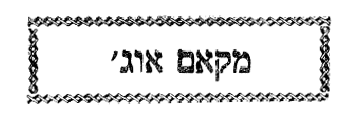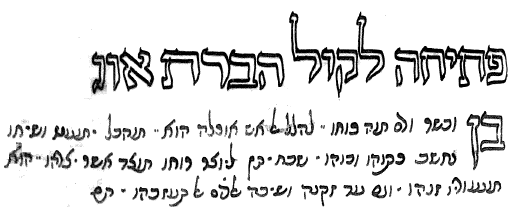

December 30, 2025 ~ Sh VAYHI. M HIJAZ.


Maqam Awj or Oj- אוג'- This is within the Sigah family. In Persian, it literally means "high sound". It is associated with the Purim festival. Musically, it is the scale of Maqam Iraq (Sigah on B half flat-Iraq, Sigah on Sigah). Sayir: sung from top to bottom. This section appears as a unique section in the Red Book as well as most other pizmonim books and manuscripts.
| Section | Pizmon | Page | Song | Commentary | Recordings | Application |
|---|---|---|---|---|---|---|
| Awj-Oj | 513 | 430 | אני בחסדך גדלתי | |||
| Awj-Oj | 514 | 430 | אל פקוד עמך |  |
M. Nadaf Moshe Diib Laniado Y. Bozo Amos Dodi Recording R Barzani- Qaddish R Barzani- Keter R Barzani- Naqdishakh Arabic: El Fuad Habaq Eliahou Ozen- Nishmat I Cabasso - Naqdishakh Maury Blanco Recording I CABASSO NISHMAT I CABASSO QEDUSHA I CABASSO QEDUSHA I CABASSO QEDUSHA |
נקדישך |
| Sigah | 528 | 443 | אל יצרני לעמל |  |
E. Menaged E. Menaged 2 G. Shrem Recording Arabic: Ya Man Asarni Bilgamal Isaac Cabasso- Nishmat Naftali Tawil- Nishmat Moshe Dwek Moshe Dwek - Pizmon Moshe Dwek - Nishmat |
נשמת |
| Sigah | 529 | 443 | מצפה לזמן |
M. Kairey Fule Yanani G. Shrem Recording Moshe Dwek Moshe Dwek - SA , BY Moshe Dwek - Naqdishakh I CABASSO SHAVAT ANIYIM |
ה' מלך | |
| Sigah | 533 | 445 | יה אוחיל |
E. Menaged S. Salem Arabic: Mohamed Selim: Ya Naheef AlQawam Y. Bozo Recording I. Cabasso Naftali Tawil- Nishmat Shabetai Laniado- Nishmat Shabetai Laniado- Nishmat 2 I CABASSO NISHMAT |
||
| Sigah | 544 | 452 | יברך החתן | Hatan. Hamaoui Manuscript Attiah Manuscript A Z Idelsohn notes, 1923 |
G. Shrem Recording Moshe Dwek Moshe Dwek - Qaddish |
אל ההודאות |
| Sigah | 553 | 459 | ימי מלך אחשורוש |
Abraham Mizrahi Kawaje - Pizmon D Binker-Duek: Pizmon D Binker-Duek: Nishmat D Binker Group: Full Pizmon |
||
| Sigah | 559 | 466 | קום ידידי הבה |
M. Habusha Iraqi version |
||
| Sigah | 560 | 467 | יום הנסים והפורקן |
J. Mosseri |
אל ההודאות | |
| 736 | 431d | אל הדור חזק ורפא |
Recording |
|||
| 830 | 431a | אומר לך נשני | ||||
| 923 | 431c | אלי ישעי יה חי |
Recording |
|||
| 1380 | תן תנה ליהודים אורה ושמחה | |||||
| 1381 | יהי אור ויאור הולך ואור | |||||
| 1382 | יה אולי ממרחק חיש פדיני | |||||
| 1384 | דבר הטוב רחש לבבי | |||||
| 1385 | ידיד ואם לא אשורך | |||||
| 1386 | יפה ענף חורש מצל הייתי | |||||
| 1387 | מאתיך תהילתי אליך אשים | |||||
| 1388 | יה רכובו עבים | |||||
| Sigah | 1391 | 472s | יביעון שפתי שירה |
Iraqi Recording Iraqi Recording Yom Tob Yanani - Nishmat M Habusha H Abraham Zafrani- Nishmat D Binker-Duek- Nishmat |
נשמת | |
| 1392 | יפקוד אל אלוהי הרוחות | |||||
| 1394 | דברתי אני אל לבי | |||||
| 1395 | יחיד אין בלתו אחר | |||||
| 1396 | אחד יחיד המיוחד קורא | |||||
| 1397 | דבר בחזון בצדקות פרזון | |||||
| 1398 | יצרפנו ככסף צרוף בעליל | |||||
| 1399 | יחידה קומי נא אורי | |||||
| 1400 | מדלג על ההרים מבשר | |||||
| 1401 | אמור יאמר עבד אב רם | |||||
| 1402 | יצר האדם לכבודו | |||||
| 1403 | 431a | אבני אקדח שים שערי |
Recording |
|||
| 1404 | יהיה לבבי אז איתן | |||||
| 1405 | דרך אמונה לי הקרא | |||||
| 1406 | דלה יונה העגונה | |||||
| 1407 | דרשו ה׳ ועוזו כי לו נאווה כל תהילה | |||||
| 1408 | אל גדול ונורא בוחר בשירי זמרה | |||||
| 1410 | נאוה תמה מיין רקחך השקיני | |||||
| 1411 | נאדרי במה אקדם פניך אלוהי קדם | |||||
| 1413 | שמחי בת ציון מאור וגילי | |||||
| 1414 | יפה דמעתיך ראיתי | |||||
| 1415 | יחלוף עלי ידידי | |||||
| 1416 | ימחץ אל ראש אויביו | |||||
| 1419 | מי כעמך ישראל מי גוי גדול | |||||
| 1420 | דמתה קומתיך לתמר | |||||
| 1421 | דלותי לי יהושיע | |||||
| 1422 | אראה אור יהל בתוך אוהל | |||||
| 1424 | ישיש עלינו אלוהינו | |||||
| 1425 | דברי שיר הלל שבח רנן | |||||
| 1426 | יום מנוחתי שמרו מרעיתי | |||||
| 1427 | בי אל דבר בי אל דיבר | |||||
| 1429 | אויתה נפשי לך דודי | |||||
| 2262 | עוז אל חי נורא תהילות | |||||
| 2263 | עזרך מקודש ישלח | |||||
| 2264 | עדי את בגדי תפארתך | |||||
| 2265 | עזרי שוכן ברום חביון | |||||
| 2266 | עליון דר עלייה | |||||
| 2647 | ישיר עמך שיר רנה ושבחה | |||||
| 2690 | אז תשמח במחול בתולה | |||||
| 2691 | אומר לך נטע נעמן | |||||
| 2700 | אערוך שיר כפי כוחי | |||||
| 4038 | 431c | אזכיר יה אבי |
Recording |